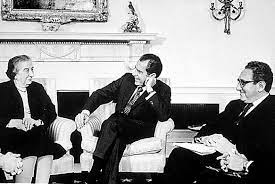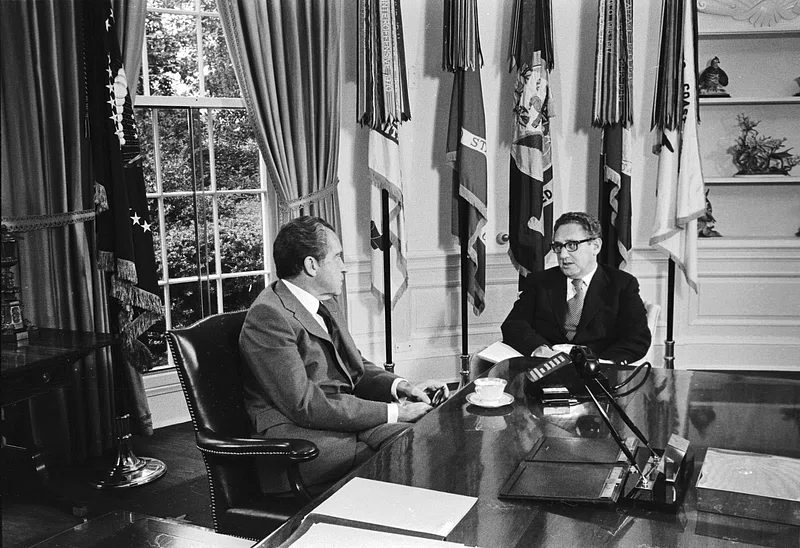
Henry Kissinger, a towering figure in American foreign policy, served as the nation’s 56th Secretary of State under Presidents Richard Nixon and Gerald Ford from 1973 to 1977. Throughout his tenure, Kissinger played a pivotal role shaping the global landscape, forging alliances, and negotiating peace accords. However, his legacy is also marked by controversies and ethical questions. This reflects upon the intricate dynamics of international relations during the Cold War era.
Early Life and Education
Born Heinz Alfred Kissinger in Fürth, Germany, in 1923, Kissinger fled Nazi Germany with his family in 1938, seeking refuge in the United States. His formative years were marked by the upheaval of war and migration. This instilled in him a deep appreciation for the value of stability and diplomacy.
Academic and Political Ascent
Kissinger’s academic brilliance shone through his studies at Harvard University. He earned his Ph.D. in 1950 and soon established himself as a respected scholar and advisor on international affairs. His expertise caught the attention of the political elite, leading to his involvement in government circles.
Kissinger’s Rise to Prominence
In 1969, President Richard Nixon appointed Kissinger as National Security Advisor, marking a turning point in his career. Kissinger’s influence grew steadily, and he became a key architect of Nixon’s foreign policy, particularly in navigating the complexities of the Cold War.






Foreign Policy Achievements and Criticisms
Kissinger’s life reflects a series of significant foreign policy achievements. He played a crucial role in opening relations with the People’s Republic of China, a diplomatic breakthrough that reshaped the global balance of power. He also pursued détente, a policy aimed at reducing tensions between the United States and the Soviet Union, which led to the SALT I Treaty limiting nuclear weapons development. His efforts in negotiating the Paris Peace Accords brought an official end to American involvement in the Vietnam War.
However, Kissinger’s foreign policy also attracted criticism. His involvement in the Vietnam War, particularly his support for secret bombing campaigns in Cambodia and Laos, remains a contentious aspect of his legacy. Additionally, his use of covert operations and his close ties to authoritarian regimes in Latin America raised concerns about his ethical conduct.
Watergate Scandal and Kissinger’s Involvement
The Watergate scandal, which unfolded during Nixon’s presidency, further tarnished Kissinger’s reputation. Kissinger was implicated in the scandal for his authorization of illegal wiretapping of journalists and political figures. He denied direct knowledge of the Watergate break-in. However, his involvement in these covert operations raised questions about his judgment and respect for the rule of law.
Impact on American Policy and Kissinger’s Legacy
Kissinger’s influence on American foreign policy extended beyond his time in office. His pragmatic approach to international relations, known as Realpolitik, emphasized the pursuit of national interests through diplomatic means. This approach has continued to shape American foreign policy. But there is also cticism for priority to national interests over ethical considerations.

Kissinger’s legacy is complex and debated. His supporters point to his contributions to global stability, his diplomatic skills, and his role in shaping American foreign policy. His critics highlight his involvement in controversial policies, his questionable ethical conduct, and his perceived prioritization of power over morality.
In conclusion, Henry Kissinger remains a controversial figure in American history. His achievements in foreign policy, such as opening relations with China and negotiating peace accords, are undeniable. However, his involvement in the Vietnam War, his authorization of illegal wiretapping, and his ties to authoritarian regimes raise ethical questions about his conduct. Kissinger’s legacy is a testament to the complexities of international relations, where moral considerations often clash with the pursuit of national interests.


